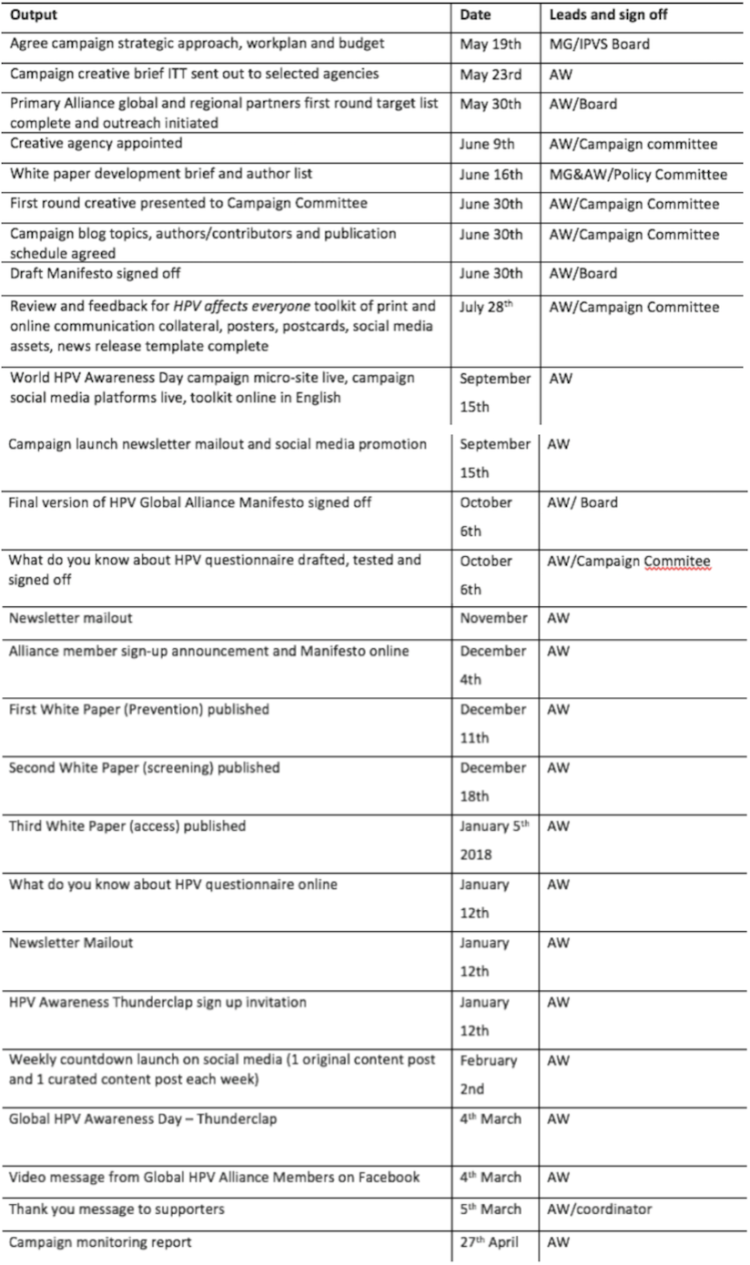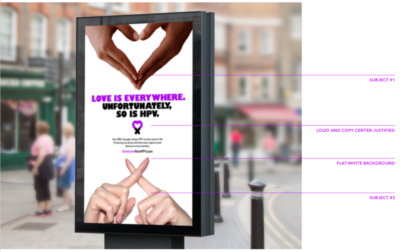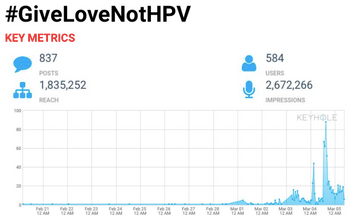HPV Awareness Day global campaign
Success achieved
HPV Awareness Day global campaign reached millions via social media, press outlets and the IPVS partners, spreading the message and encouraging conversation in multiple languages.
- Website
- https://ipvsoc.org
- Project dates
- March 2017 - March 2018
Project team
- Campaign and Partnerships Manager, Anita Wiseman
- Association Manager (no longer in post)
Tools & Systems
The social media campaign was run on owned accounts on Twitter, Instagram, and Facebook to promote public engagement and to provide a focal point for the distribution of core campaign assets to our partners and stakeholders.
Introduction
HPV is a virus that is not well recognised or understood by members of the public, despite the fact that 80% of us will have HPV at some point in our lives. Where awareness of HPV exists, this is most likely understood in the context of cervical cancer which is not surprising, given that cervical cancer is in the ‘top four’ cancers affecting women. Rates of HPV-related cervical, mouth, throat and
anal cancers in men and women have highlighted the urgent need for better public awareness. Opportunities also exist as a result of the World Health Organisation (WHO) commitment to the elimination of cervical cancer.
As the globally recognised experts in the virus, the International Papillomavirus Society (IPVS) is clear that broad public awareness and openness to discuss HPV is foundational to any strategies that aim to improve the uptake of HPV vaccination and cervical screening. Public awareness of their risks and the opportunities to reduce those is also critical to the creation of demand for vaccination and screening in countries where access is limited.
Communicating globally about HPV is however fraught with challenges – the stigma of public discussions of sexual behaviour and relationships in different communities, vaccine scepticism and increasingly sophisticated counter-campaigning that is not based on evidence are all key challenges that are a truly a matter of life and death.
Discovery
IPVS is a research organisation that is recognised as the global expert in HPV and related disease. The campaign drew on IPVS members’ scientific expertise and existing research data regarding the global burden of disease alongside key public awareness and policy issues around access to vaccination and screening.
Additional campaign specific research included a comparative review and analysis of online and offline communication campaigns in the global health and sexual health space, analysis of trends and content preferences on social media. Telephone consultation with IPVS members and stakeholders such as the Centre for Disease Control (CDC) and the American Cancer Society (ASC) regarding HPV communication priorities and campaign alignment were undertaken to inform the campaign focus and refine messaging.
Online and network research was undertaken to identify and recruit international, regional and national organisational partners outside the IPVS membership who shared common commitment to addressing HPV and its related cancers.
Objectives
IPVS announced the launch of a public awareness campaign that would focus on the annual celebration of World HPV Awareness Day. The campaign theme for 2018 was ‘HPV affects everyone’. IPVS has articulated the campaign objectives as:
- To drive global awareness of HPV, its prevention and associated diseases
- To support IPVS advocacy efforts by working with partners in government, non-profit organisations and individuals to take action against HPV
To achieve these objectives IPVS identified communities, schools, clinics, universities, political and patient groups as important campaign partners and gatekeepers to audiences at risk of HPV and associated diseases. These stakeholders can be defined at global, national and local level. A target recruitment number of 20 was established.
As year one of the campaign, it was decided to use these objectives to establish a baseline for engagement that would be built on over the three-year span of the campaign cycle. An additional baseline, HPV awareness survey has been delivered by IPSOS MORI to track changes in knowledge, attitudes and behaviour over time in priority countries.
Timeline
- March 4th 2017 – IPVS announce that there will be an inaugural HPV Awareness Day on March 4th 2018.
- April 2017 – Approval of the Campaign Strategy Concept paper to Advocacy Committee and Society President
- May 2017 – Partner outreach and recruitment initiated
- July 2017 – Creative brief sent to five agencies
- Sept 2017 – Campaign planning workshop in Amsterdam. Pitch presentations and agency selection.
- Dec 2017 – Stakeholder interviews with committee members and partners to inform campaign creative
- Jan 2018 – Presentation of campaign creative concepts – selection of #GiveLoveNotHPV as campaign theme
- Feb 2018 – Campaign website live and campaign resources shared with partners to support local campaign development
- Feb 14th - Valentine’s Day soft launch for ‘Give Love, Not HPV’
- March 4th – First ever International HPV Awareness Day
Activities
Strategy:
As the first global HPV awareness day, year one of the campaign must be focused on developing the enabling mechanisms to establish and grow the global campaign over the next three years and beyond. In order to contribute to the achievement of the campaign objectives emphasis on Year 1 will be on the following three complementary activities:
- Identifying potential campaign partners and establishing a Global HPV Alliance to act as a mechanism for ongoing collaboration and support the reach and impact of future World HPV Awareness Day campaigns. The development of an Alliance addresses the theme of ‘HPV affects everyone’ by creating and profiling a broad coalition of organisations, representative of diverse communities, all committed to the key issues around HPV prevention, screening and access.
- Developing and delivering translated and locally adaptable offline campaign materials. Offline resources will provide important support for local awareness and advocacy activities coordinated by IPVS members and partners, especially in Low- and Middle- Income Countries.

Logo translations
- Development and delivery of a digital and social media strategy focused on World HPV Awareness Day that establishes and builds social media presence and engagement in HPV Awareness Day while providing a base to grow and involve online audiences year on year
Key outputs & milestones:

Innovation
The campaign developed a fresh visual style and tone of voice that was distinctive in the context of global health promotion campaigns. High quality, consumer-oriented imagery and a call to action that focused on sharing love was used to gain attention in a competitive social media space. Soft launching the campaign on Valentine’s Day maximised the impact of the love theme as did using Mothers’ Day in the US to highlight issues around screening. The suite of campaign resources reflected the full diversity of loving relationships and took HPV beyond discourse around vaccination to discussion of screening targeted at mothers and daughters, as well as to same sex partnerships and young people.
Marketing
The campaign was promoted through direct outreach and communication with potential partners. Once partners had agreed to come on board they received regular e- newsletters with campaign updates, access to partner Dropbox files and support from the Kenes Campaign team. Partners could, upon signing an MOU, receive privileged access to design files to support co- branding and localisation.

Brand guidelines for posters
Official partners were a key element in the promotion of the campaign in specific geographic regions and were able to flex messaging and adapt core campaign materials to support their local conditions, challenges and priorities.
A campaign website provided a focal point for partners and stakeholders to access campaign materials and essential information about HPV. Social media channels and social content also served to drive awareness of HPV and public engagement in the campaign.
A press release was distributed internationally to top tier health titles. Again, an adaptable local release was shared with partners to raise awareness of the campaign and to highlight the relevance and issues in specific communities/geographies.
Challenges
IPVS doesn’t have any organisational members and the profile of its members have research or clinical expertise and operate within these specialist communication networks. Campaign success was predicated on the identification and on-boarding of a large number of high- profile organisations with the capacity to support delivery effective public communication campaigns.
As a sexually transmitted infection communication around HPV transmission, while essential to supporting informed decision making, was especially challenging in some cultural contexts. The campaign theme ‘Give Love, Not HPV’ was considered controversial by a number of partners who nevertheless supported the campaign and were able to adapt the campaign to their specific needs and priorities.
Achievements
The inaugural campaign reached millions of people, providing key information about HPV prevention and management which was seen as the foundation of achieving the society’s ultimate goal of HPV elimination.
Worked from the premise that HPV affects everyone - either directly, or indirectly –the campaign sought to reach out to men as well as women and to a diverse age range. Data suggests that this was achieved, and a key surprise was the level of engagement from men which was higher than anticipated and accounted for a significant section of the campaign audience.
Questions were asked in parliament regarding vaccination policy and workshops on HPV were delivered in community venues around the world creating a real buzz around the topic of HPV.
The target recruitment number of 20 high level partners was smashed – over 80 high level associates were recruited in support of the 2018 campaign. This partnership has remained largely in place for 2019 providing a sustainable base for campaign growth.
IPVS reputation and brand was strengthened, raising the overall standing of the association by providing leadership to a global initiative and by involving and partnering with people and institutions beyond their immediate members.
Targets & Statistics
Results demonstrated that on social media the #GiveLoveNotHPV drove a massive increase in the global conversation about HPV:

Campaign hashtag, Twitter metrics
- Online conversations about HPV increased by over 5,000% between March 2nd – March 5th 2018 compared to the same time period in 2017
- The campaign hashtag reached 2 million unique users
- A short information video received 30,000 views
- The campaign website achieved 5,000 unique page views
- The campaign press release was picked up by 250 outlets with coverage in top tier media around the world
- Over 80 high level organisations signed partnership MoUs and participated in the 2018 campaign.
Financials
No fundraising was taken to support the awareness day. A total budget of around US$60,000 was spent on campaign delivery.
US$165,000 was subsequently received from industry partners to support the development of additional patient information resources and to support International HPV Awareness Day in 2019.
What would we do differently?
Due to budget and time constraints in 2018 it was not possible to conduct baseline awareness research or to conduct ‘real world’ testing of the communication materials with the intended audience. This has been addressed in the 2019 campaign with an IPSOS MORI pre and post campaign awareness survey and online social media content and messaging tests.
Advice
Getting cut through for a campaign, especially one that is starting from scratch, requires campaigns that have creative edge and that really start with the perspectives and online behaviours of the target audience. With so many demands on peoples’ attention be prepared to take some calculated risks and be (a bit!) controversial.
Feedback & Testimonials
IPVS President and Advocacy Committee Chairs received a Lady Ganga Trailblazer Award, from the Global Initiative Against HPV and Cervical Cancer, in recognition of the campaign and IPVS’s ‘exceptional creativity in proposing and executing impactful grass roots approaches to raising awareness of HPV and HPV diseases.’
“It was genuinely exciting to watch the campaign spread around the globe on March 4th. Feedback from our partners shows that the day really helped to achieve both IPVS and HPV community objectives and we sincerely appreciate your support and input.”
S. de Sanjosé, IPVS President
Wider impact
The strategy to build partnerships with different bodies clearly played a crucial role in the campaign’s success - it seems the world was ready to come together to deliver an HPV awareness campaign:
- Over 40 events in 16 countries were delivered
- Events spanned Parliamentary debates, HPV testing drives, community presentations, media interviews, lectures, public information booths, leaflet distribution, conferences and city running events.

